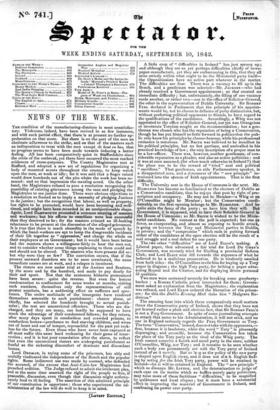NEWS OF THE WEEK.
Tut condition of the manufacturing-districts is most unsatisfac- tory. Violences, indeed, have been revived in so few instances, Tut condition of the manufacturing-districts is most unsatisfac- tory. Violences, indeed, have been revived in so few instances, and with such partial effect, that there is at present no further ap- prehension on that score. But there is on the part of the men an obstinate adherence to the strike, and on that of the masters such
an indisposition to treat with the men except de haul en bas, that
no progress seems to have been made towards inducing a better feeling. All has been comparatively quiet in Staffordshire since the crisis of the outbreak, yet there have occurred the most marked evidences of cross-purposes. The County Magistrates met at Stafford, and adopted a new set of regulations for organizing a body of mounted scouts throughout the county, to keep watch upon the men, at work or idle ; for it was said that a finger raised would draw hundreds out of the pits where the work has been re- sumed: and on that impression the meeting acted. On the other hand, the Magistrates refused to pass a resolution recognizing the possibility of existing grievances among the men and pledging the
Magistrates to see justice done. There were obvious objections to a resolution so framed as to imply a necessity of pledging Justices to do justice; but the recognition that labour, as well as property, has rights to be protected, would have been becoming and well- timed, and might have been recorded in an unobjectionable shape. Again, Lord DasTmotrru promoted a common meeting of masters and workmen ; but his efforts to conciliate were less successful than they deserved to be; for the masters evinced an ill-looking reluctance to be present at the discussion of the alleged grievances. It is true that there is much absurdity in the mode of speech by which the hand-workers are apt to lump the disagreeable incidents of their life together as "oppression," and charge the whole on their employers or on Government ; but it would have been better had the masters shown a willingness fairly to hear the men out, and to consider whether some things unpleasing to them could not and should not be altered. The masters who were present did so ; but why were they so few ? The conviction occurs, that if the present outward disorders are to be soon terminated, the same immediate causes are at work, and a relapse is imminent.
The rioters are now under trial at the Assizes and Sessions, by the score and by the hundred, and made to pay dearly for
their sad sport. Not that the sentences hitherto pronounced have been severe : quite the reverse. But even the lenient condemnation to confinement for some weeks or months, visiting such numbers, themselves only the representatives of still greater numbers, has a saddening effect on sufferers and spec- tators. The entire multitude of the insurgents have rendered themselves amenable to such punishment : chance alone, or chiefly, has selected the hundreds brought to actual punish- ment; the rest are unconvicted offenders. Those who are dis- charged, and they are many, can hardly be supposed to have much the advantage of their condemned fellows; for they return, after many days spent in comfortless and crowded prisons, to comfortless homes—perchance to find starving children, and wives out of heart and out of temper, reproachful for the past yet reck- less for the future. Even those who have never been captured at all must suffer this same hard reckoning for their game of insur- rection; and it is but poor consolation after the alarm, to reflect that even the unconvicted rioters are undergoing punishment so fearful as the sickening discomfort of destitute and discordant homes.
Lord DENMAN, in trying some of the prisoners, has ably and usefully vindicated the independence of the Bench and the popular rights. Some indiscreet use was made by counsel, who defended the accused, of the excuse that Anti-Corn-law Magistrates had Preached sedition. The Judge refused to admit the irrelevant plea, and at the same time asserted the right of the people to free, if peaceable, discussion, even though that discussion might unfortu- nately lead to ill feeling. The assertion of this admitted principle of our constitution is opportune : those who superintend the ad- ministration of the law will do well to keep it in mind.


























